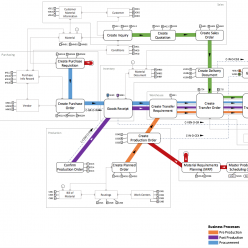During the class discussion this week, we realized that how ERP system is helping business process integration.
Business process goes cross different department, and ERP system record business process. Without ERP system, a simple sales order needs all different departments to communicate constantly. ERP system help enterprise to save a lot of money and improve collaboration around varies departments while running business. Most importantly, ERP system stores a lot of important financial data and will help better decision making.
In managerial accounting, ERP system will help management to access reports more quickly and make a sufficient budgeting. ERP system can also help avoid repetitive communication and redundant operation.
Especially in the production industry, ERP system will help keep a better inventory control and production. We can minimize our inventory cost and production cost base on the sales orders we received.
In all, ERP system is helping managing operation in every aspect in the organization.
